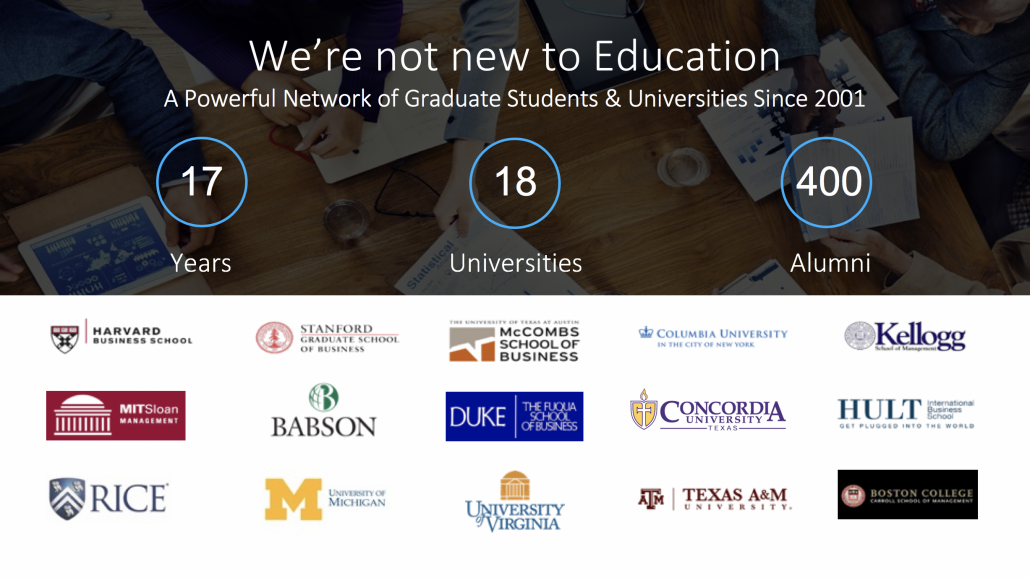Entrepreneurial Education, Outside of the Box
In this case the box is the classroom and although the classroom is a wonderful place to learn, there are several under-the-radar options available for those seeking to further their entrepreneurial education.
Entrepreneurial education is not limited to formal 4-year university programs; an abundance of educational resources are available for individuals seeking to enrich their entrepreneurial knowledge base outside of their major. In fact, some of these resources allow one to learn from industry experts from the comfort of their own couch, such as the video-based learning materials produced by G51 EDU.
G51 EDU produces video-based business cases over successful startups, including real entrepreneurial interviews, quizzes, discussion topics and lecture slides. These insightful videos breakdown each startup presenting the 6 tenants of entrepreneurship to give a holistic review of each company. Such insights help individuals understand what it takes to form a new business, where pain points lay within their industry and how to deal with said issues. G51 EDU covers industry spanning from fine art to sports marketing to law. To learn more please visit G51 EDU.
G51 also offers a semester-long scholar program for both MBA and undergraduate students; with spring and fall dedicated to MBAs, we open the summer for undergraduate students that also wish to learn the fundamentals of deal flow, due diligence, startups and entrepreneurship. This program aims to bring experiential learning to students of all backgrounds; from law to language, sciences to sociology, and everything in between. Care to to learn more about our scholar program? Visit G51 Venture Scholars, or send your resume to brigitte@g51.com.
Shared below is a list put together by Mark Henricks for entrepreneur.com to highlight some of the additional resources that you may use to further your entrepreneurial career:
- Small Business Development Centers (SBDCs): SBDCs frequently offer a variety of seminars on topics from marketing to finance. Although usually not offered for college credit, these courses can help small-business owners develop their skills.
- Alumni outreach programs: Successful graduates of universities often offer to help current students, recent graduates and even unaffiliated businesses in the university’s community by sharing their information, expertise and, sometimes, financial help.
- Networking events: You might learn a lot just by hanging out and talking to people at business mixers, management lectures and the like – both on and off campus.
- Business incubators: Many groups and universities are setting up business incubators to help launch small businesses and specifically in the case of university incubators, to commercialize student research. The G51 team is proud to act as the “entrepreneur in residence” at the Concordia University Incubator, namely the Incubator CTX.
- Manufacturing assistance centers: Numerous colleges and universities have government-assisted centers with the mandate of helping local factories improve their competitiveness.
- Entrepreneurial resource centers: Miscellaneous resources that could help entrepreneurs range from using university libraries to taking part in research projects to recruiting business students to work as interns.
- Continuing education programs: Continuing education classes in business are often full of working students who can add their wealth of real-world experience to what the lecturer has to offer.
- Night schools: They may not have the cachet of regular daytime courses, but night classes are often taught by the same professors and cover the same material, for the same credit.
- Community colleges: The nation’s thousands of community colleges provide low-cost, convenient educational opportunities for entrepreneurs who need basic instruction in topics such as information technology, accounting, marketing and management.
- Executive MBA programs: If you want to get your driver’s license for the business fast lane, two to six years in an executive MBA program, usually meeting only at night and on weekends, can get you there.
If you care to learn more about G51 and it’s three foci: G51 EDU, G51 Venture Scholars and G51 Consulting, please visit www.g51.com.




